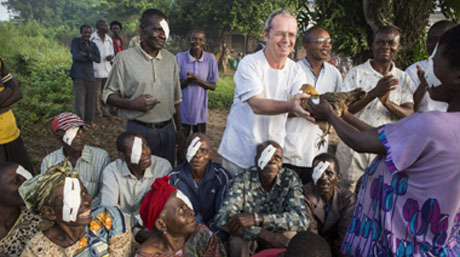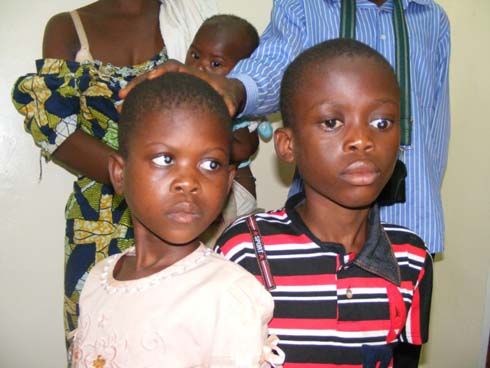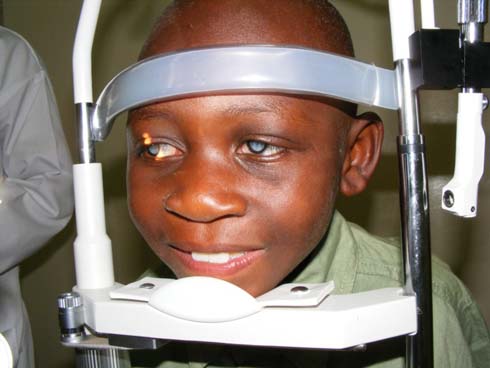Nemrég operáltunk egy beteget. 70 éves, jó karban levő bácsika. Simon Pierre ápolóm szólt: Te doktor, ez a Józsi bácsi már a negyedik beteget hozza hozzánk, ő maga toborozza őket, hallgasd már meg, mit mesél! No, hallgassuk együtt. Közben ne felejtsük, kérem, 2011-et írunk, a föld minden kontinensén!
I had a chance to perform another ophthalmologic mission in Lubumbasi, the capital of wealthy Katanga county. The aim of these missions is twofold: to operate on children and to give advanced training to the surgeon of the St Bernadette Ophthalmologic Centre. This dual task is difficult because I see and operate on a great many children, and there is simply no time left for the second one.
Siblings with cataracts. The serious amblyopia (dim vision) is due to belated operations
Arriving in Kabinda, I was faced with a shocking sight. Of course, I came primarily to cure ophthalmic patients; our arrival had been advertised all over the place. However, entering the hospital I was once again confronted by the prevalent depth of misery. My first impression was that I had happened upon a camp site. Everywhere in the hospital courtyard small groups of families were settled on mats, sheets, etc. The 40 bed children's ward housed 150 patients! Of these, 80% were suffering of kwashiorkor. The children often live with their parents and siblings in the hospital for several weeks, possibly months. The nutritional program provided by our community is a huge attraction for families starving in the villages. It takes 3-4 weeks for a child to recover from kwashiorkor.
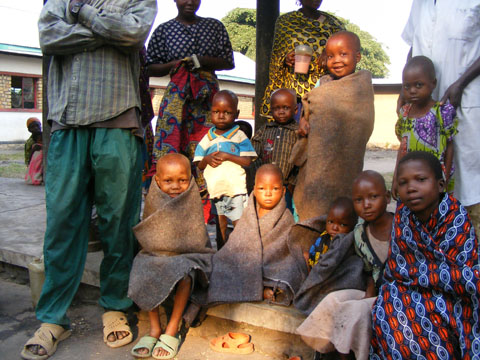
UNICEF helps us with special formulas and medicine. A big problem though is that it is very cold here at this time of year. There is a lot of rain and overnight the temperature drops to 16-18 degrees. Everything is very wet, and the children sit around shivering all day.
Our appeal that we had published here, according to which we were collecting money for procuring blankets, proved to be very successful as several of our supporters have come to our help, and their purchase is now in progress! We thank you for your timely assistance, since a warm blanket can be a lifesaver for children whose constitution is weakened by kwashiorkor.
Richard
We were on our way again... Me, Patient and Etienne, my two specialist ophthalmic nurses. The dry season gave us an excellent opportunity to get going again to help patients in remote areas. „Brother Richard, why are you going on missions to faraway places, when you have plenty of patients right here in Mbuji Mayi,” a European acquaintance asked me. We sat down, and I attempted to explain to him the isolation, loneliness and wretchedness of the people living in the interior regions. All one had to do – I said – was to look at the figures and the number of patients we treat on these occasions, and you will be shocked at the situation: patients frequently travel 4-500 kilometres on foot, a large number of them whose ailments have been totally neglected, some of them who have lived without sight for ten years; their only desire is to see again
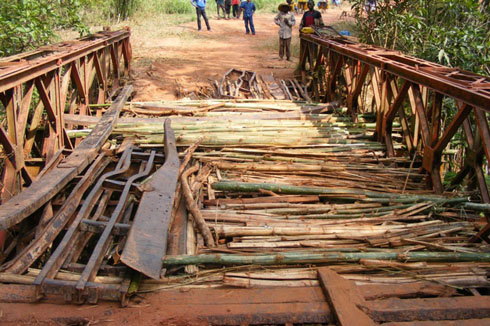
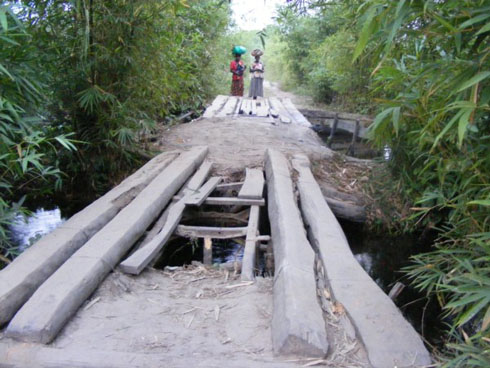
.
This year I decided to return to the land of the Pigmies, and to double the time we will spend there. That is how our plan was born to stay for three weeks in the village of Lokoko-Pelenge and another three weeks in the little township of Kole.
After a long wait, the dry season has arrived at last. This is of great importance around here, as that is the time when the people are building, making bricks and drying them on the ground; when all the trees are blossoming, especially the mango trees, while others lose their leaves; the locals burn off the tall elephant grass… and that is when we set out to faraway places to carry out ophthalmic missions. It is much easier to travel during these months, as the roads are dry and the nights are nice and cool.
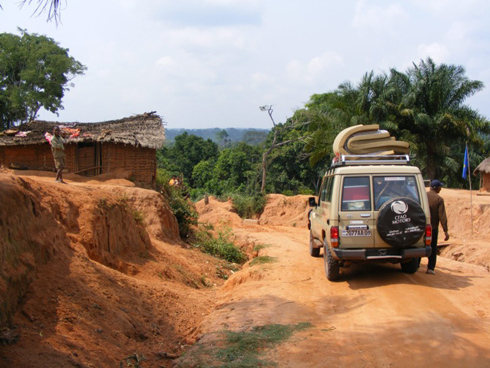
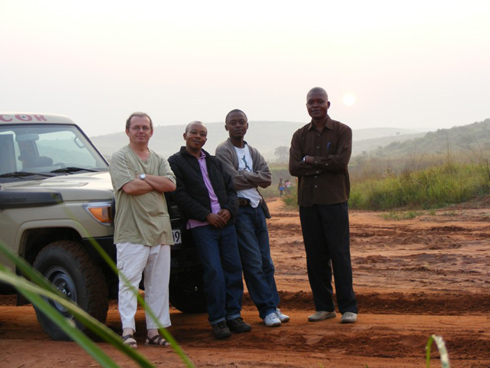
This was our third mission in Lusambo. Our accommodation was a rented house for the four of us: two doctors and two ophthalmic nurses.
Thanks to the cooperation of a Belgian non-governmental organization (World Wide Ophthalmology), we have been able to organize a week-long ophthalmologic mission at the St Raphael Ophthalmologic Centre in Mbuji Mayi. Our goal was to carry out as many operations as possible. Mbuji Mayi is a city of two million. According to various sources, there are 12,000 people blinded by cataracts living in the city! It takes a long time for our small centre with its annual 800 cataract operations to make significant inroads into that number! I thought we should try to arrange a cataract campaign where we could operate virtually free of charge asking for outside support.
The Belgian mission was a great success. In one week we managed to perform 200 cataract operations. Contribution to the operation was set at $10, and having regard to the great poverty here, we treated many patients for free.
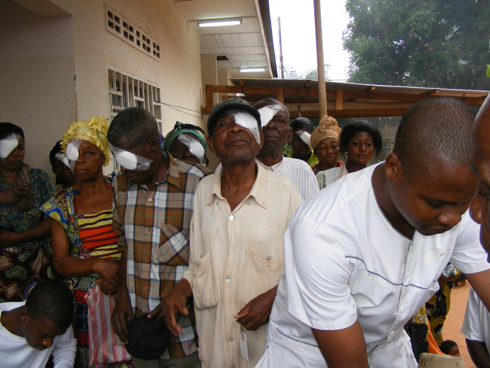
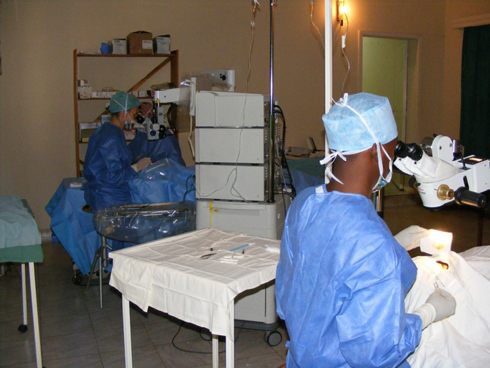
With three microscopes we could work on three tables simultaneously.
Are your glasses broken? Has the doctor prescribed new glasses?
No worries... OPTICA Mbuji-Mayi solves all your problems!
Wend your way through the SIMIS market, where you will find the only optician in the city of two million inhabitants. He’ll make you a pair of first-class spectacles within twenty minutes as long as you bring your own frames and a pair of lenses. Service while you wait! Each work phase of the production can easily be followed.
Let us too follow how a pair of glasses prescribed by Dr. Richard Hardi are prepared in Mbuji Mayi.
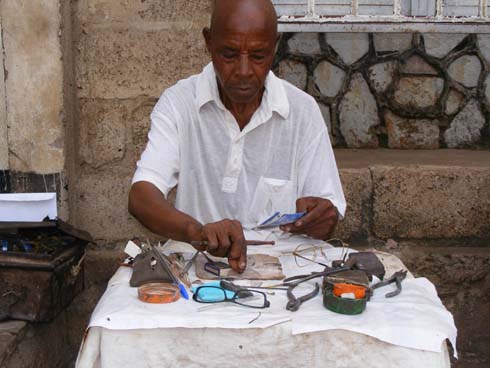
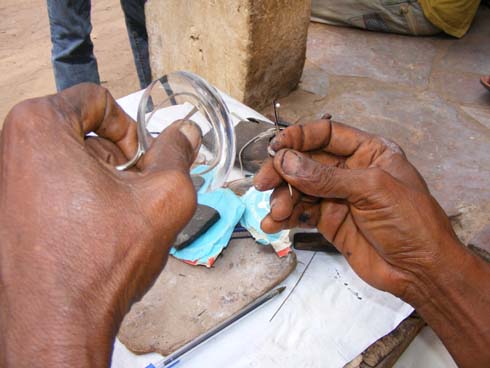
Good day! Have you brought lenses and a frame? Take a seat; I shall start working on it straight away.



